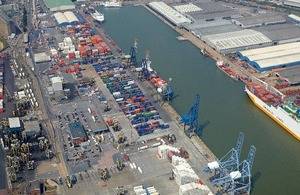UK's Ambitious Goals for Carbon-Free Vessels: Maritime Decarbonization Strategy Unveiled
Key Ideas
- The UK government aims to make all vessels operating in UK waters and docking at UK ports carbon free by 2050, aligning with ambitious global goals.
- The Maritime Decarbonization Strategy sets targets to reduce greenhouse gas emissions by 30% by 2030 and to zero by 2050, positioning the UK as a clean energy superpower.
- Investment in green technologies and fuels, such as hydrogen and electric vessels, is key to achieving the decarbonization goals and driving a green economic revival.
- Expansion of the UK Emissions Trading Scheme to the shipping sector, with a focus on larger vessels, aims to incentivize emission reductions and promote cleaner fuel technologies.
The UK Maritime Minister, Mike Kane, has unveiled the government's new goals for the maritime sector, with a focus on decarbonization. The Maritime Decarbonization Strategy outlines ambitious targets to significantly reduce greenhouse gas emissions from ships operating in UK waters. By aiming for a 30% reduction by 2030, 80% by 2040, and ultimately carbon neutrality by 2050, the UK is aligning with global efforts to combat climate change.
The strategy emphasizes the importance of investing in green technologies and fuels to propel the country towards becoming a clean energy superpower. By bringing the shipping sector under the UK Emissions Trading Scheme (ETS), the government plans to hold operators of larger vessels accountable for their emissions, driving them towards cleaner practices. The strategy also advocates for the use of clean fuels like hydrogen, electricity, and ammonia to power vessels, highlighting the role of innovation in achieving sustainability.
Stakeholders in the maritime industry, including the British Ports Association and the SASHA Coalition, have expressed support for the government's initiatives. The announcement of two calls for evidence demonstrates a commitment to gathering input from industry experts to shape effective measures for emissions reduction and energy transition at ports. The focus on green hydrogen and e-fuels as key solutions to maritime decarbonization underscores the importance of aligning regulatory frameworks with sustainable practices.
Overall, the UK's Maritime Decarbonization Strategy signals a significant step towards a greener, more resilient maritime sector. By setting forth clear targets, leveraging innovative technologies, and engaging stakeholders, the UK aims to lead the way in sustainable shipping practices and contribute to global efforts in combating climate change.
Topics
Maritime
Energy Transition
Green Economy
Maritime Industry
Emissions Reduction
Sustainable Shipping
Government Strategy
Latest News
